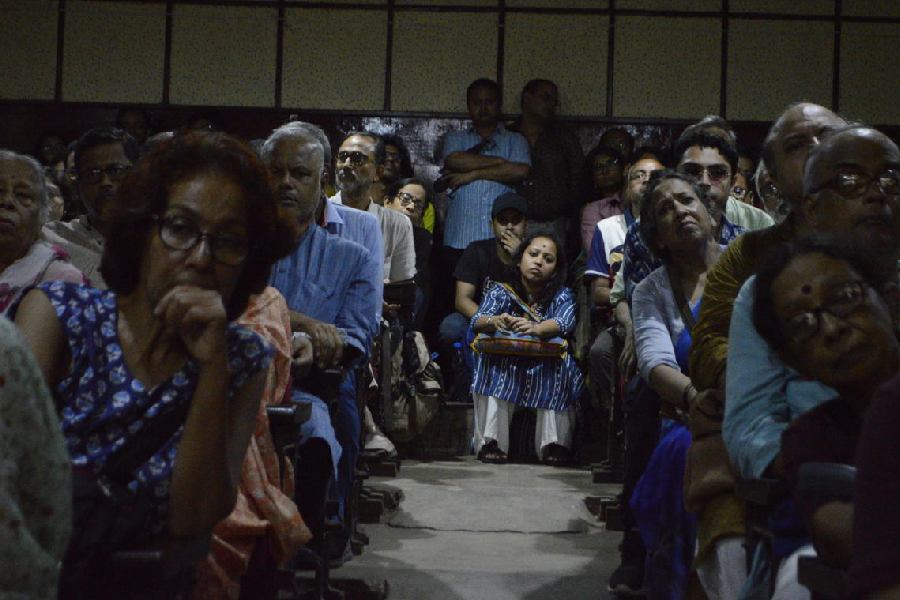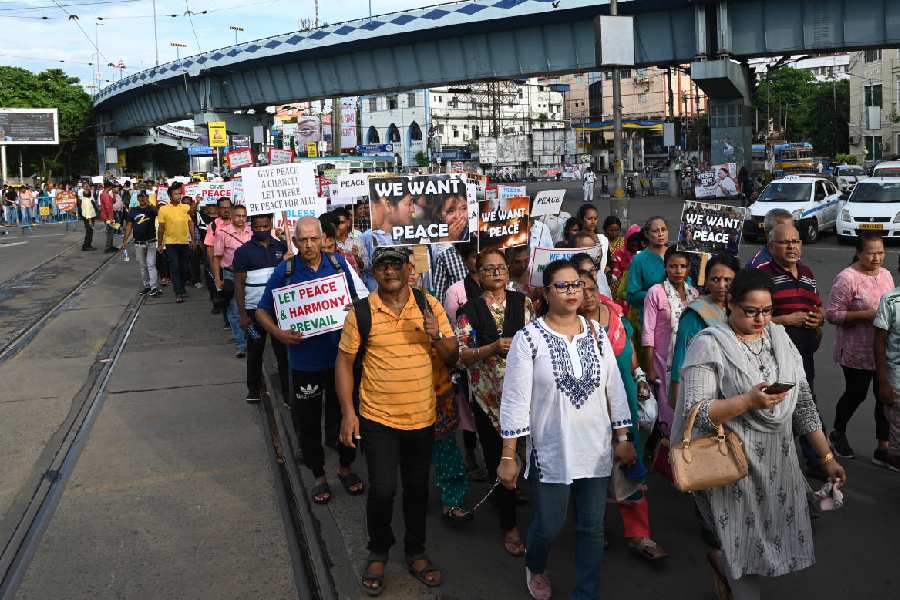The creaky seats were all taken. Many people were standing in the aisles and many others sat on the floor. On stage were a couple from Kerala.
Moments earlier, around 4km away, a peace march saw over 1,000 people walk. No slogans or party flags. Just peace on their lips.
The two events on Sunday evening were nothing like the usual weekend programmes that keep the city hooked. But the overwhelming response to them reaffirmed the spirit of Calcutta, said the organisers of the two programmes.
One of the events was a rally that prayed for peace in strife-torn Manipur, where the ongoing conflict has killed at least 150 people and displaced around 60,000.
The other featured a talk by Malayalam journalist Siddique Kappan, who spent 28 months in jail without a trial for trying to report on the alleged gang rape and murder of a Dalit teenager in Hathras, Uttar Pradesh.

Members of the audience sit on the floor and stand at the back of a packed Sujata Sadan to listen to Siddique Kappan on Sunday evening. Picture courtesy: People’s Film Collective
The peace march, which started from Don Bosco School in Park Circus and culminated at the statue of Mother Teresa on Park Street, was organised by the archdiocese of Calcutta.
It saw people from different walks of life walk for their “brothers and sisters in Manipur”.
“It shows that we (in Calcutta) care for others and especially in times of difficulties we are with them, whether they are far away or close,” the archbishop of Calcutta, Reverend Thomas D’Souza, who gave the call for the march, told Metro on Monday.
“I was surprised to see many elderly people joining the walk and they said they came because they wanted to,” the archbishop said.
Margaret Gomes, a 50-year-old homemaker, completed her family chores earlier than usual to participate in the rally. “I think it is my duty to other citizens. I am here because I am a human being,” she said.
Many people joined the march forgoing their usual leisurely Sunday evening walk.
School principal Ian Myers said the turnout was a “sign of the genuine concern and care of the people of Calcutta”.
“In Calcutta, we still have it in us to stand up and share our opinions, strongly,” he said.
An hour later, the audience at Sujata Sadan in Hazra stood up to give a standing ovation to Kappan and his wife Raihanath.
“The auditorium has some 300 seats. But around 400 people had turned up,” said Kasturi Basu, one of the founders of the People’s Film Collective, which organised the event.
Campaigns on social media and some posters in the city were all that the organisers could manage in the run-up to the programme.
Kappan had a flight to catch the same night because he had to appear at the local police station in his hometown in Malappuram district in Kerala on Monday.
But he found it difficult to leave the auditorium because everyone wanted to congratulate him after the talk.
Some of the loudest cheers were reserved for Raihanath, who spoke only Malayalam. Her husband translated her speech into English and Hindi.
“I did not give up, not so much because it was my husband but because he was trying to report the brutality unleashed on a girl. I have two daughters myself,” Raihanath said.
Even as the couple were escorted to a car waiting outside, many people lined up and some banged on the window to just give a high-five or do a namaskar.
Kappan told Metro from Kerala on Monday: “I do not have words to express my gratitude for Calcutta. This was my first trip to the city. To see a packed hall in an unknown place, to see so many senior citizens and women, these things give you strength and belief.”
Barnali Das, who teaches mathematics at a girls’ school in south Calcutta, was in the audience. She asked Kappan if there were other journalists who tried to cover the alleged brutality in Hathras and, if yes, why was Kappan singled out and targeted.
Kappan, who in Delhi had taken part in anti-BJP-RSS protests on a range of issues, including the 2020 Delhi riots and the murder of journalist Gauri Lankesh in Bangalore, said he was “targeted” because he was already “under the surveillance of the central agencies and Delhi police”.
Das told this newspaper on Monday: “I am enraged by seeing what is happening around us. An autocratic regime is unleashing all its might on rights activists. For me, people like Kappan, Umar Khalid and Teesta Setalvad are inspirational. My dream is to talk to them one on one. But that is far-fetched. In such a situation, a public interaction featuring them is the second-best thing for me.”
Also in the audience was Sarmistha Dutta Gupta, writer-curator and founder-secretary of an NGO. She said: “I had a prior engagement at another place. It was very important. But listening to Kappan and Raihanath was my topmost priority. I made a delayed entry at the other place.”
Father Basil Mandi, parish priest of the Church of Christ the King in Park Circus, who was part of the peace march, summed up the spirit of Calcutta: “Calcutta gives space to express ourselves. People are respectful, open and liberal and the march sends out that message to other parts of the country.”
